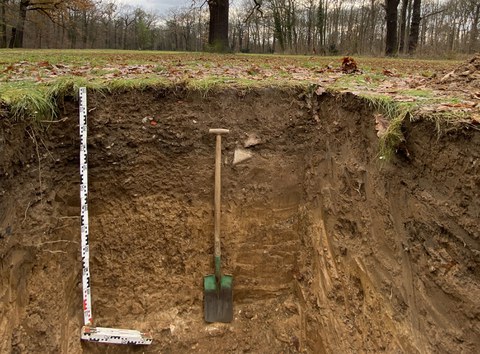Sep 26, 2024
Climate Change Campaign Day on September 28 in Dresden's Großer Garten: Versatile soil – our useful helper in climate change

A soil profile in the oak-tree meadow of Dresden's Großer Garten: a deep insight into an otherwise hidden world. This is where the trees are anchored, and absorb both wate hidden world. This is where the trees are anchored and absorb water and nutrients.
Climate change is increasingly affecting the proper functioning of our ecosystems. The same holds true for the Großer Garten, which is considered Dresden's green lung. Sweltering heat combined with drought, torrential rains and violent storms are becoming ever more frequent and occur in rapid succession. This phenomenon particularly affects the old tree stock, which increasingly endangers the value of the Großer Garten as a recreational area and cultural monument.
Against this background, a campaign day on Saturday, September 28, 2024 – with TU Dresden as a partner – will be dedicated to our soils, and for good reason: After all, healthy soils provide a variety of benefits for both humans and nature, be it as a habitat or in their role as a reservoir and regulator in the water balance. Trees and other plants would not be able to survive without their roots having the possibility to absorb water and nutrients in the soil. The evaporation of water through their leaves cools the environment, a particularly welcome effect in cities during hot summers.
In the context of climate change, soils are also important carbon storages, as the climate-relevant CO2 gas is removed from the atmosphere while being stored in the soil for the long term. In most cases, the quantities stored are significantly larger than those stored by plants above ground. Since healthy soil is also inhabited by a large number of very diverse organisms, it contributes significantly to biodiversity. What's more, soil organisms are essential for numerous ecosystem services. As such, soil in its diversity is a true all-rounder and indispensable helper in the face of climate change.
On the campaign day, staff from the State Palaces, Castles and Gardens of Saxony (SBG) and the Institute of Soil Science at TU Dresden will be providing “in-depth” insights into the hidden but extremely fascinating world of soils. Both institutions have been working closely together for three years in a project funded by the German federal government. On campaign day, they will be supported by other stakeholders such as the Dresden municipal sewage company, the Dresden environmental agency, the Senckenberg Museum of Natural History Görlitz and the Dresden Garden Society. The event strives to reach out to the general public.
From 10 am to 12 noon, there will be short lectures and discussions at the Palais in the Großer Garten. From 1 to 4 pm, you can find out all about soil at three different locations in the park and in the neighboring Botanical Garden, and take part in various hands-on activities and guided tours. Have a look through the microscope, for example, and you will see the mesmerizing diversity of organisms that can be found in a soil sample. We rarely notice the tiniest of creatures, although they are everywhere and have amazing abilities. “Bacteriopolis – the hidden world of microbes,” a traveling exhibition curated by the Faculty of Biology at TU Dresden, presents illustrative examples and invites you to take a closer look at microbes.
Amateur gardeners can discuss their experiences and ask questions about their soil at home. Why not try out for yourself how much water the ground can absorb at the seepage test site on the oak meadow and find out how the soil contributes to the "sponge city" of Dresden. Moreover, there will be exciting answers to the question of how we can take a close look deep underground without disturbing and destroying it by intense drilling and digging. Not only technology freaks can experience how sophisticated methods such as georadar or geomagnetics are used for this purpose. These high-tech methods reveal large roots, stones, buried paths, pipelines or filled-in bomb craters from the war period. You can get involved in installing the sensors and take part in the measurements yourself. The mobile computer screen provides completely new and unexpected insights.
The campaign day will be an experience for all the senses: seeing and recognizing, feeling, smelling and even hearing... Whether young or old - you will learn a lot about what usually remains undiscovered under our feet: differently colored soil horizons, the mixture of humus and mineral grains, stones, the winding paths of water through the root network or the pore space with its soil inhabitants such as earthworms or fungi. You can experience up close what makes our soil so valuable for the ecosystem and for us as humans. In addition, you will get an impression of how soil science contributes to making Dresden's Großer Garten fit for climate change as the city's green lung. The results of the ongoing research will help to better adapt the park management to the challenges of climate change in the future. This includes soil loosening, irrigation, nutrient recycling, such as through the sustainable use of compost or self-produced biochar.
More information:
https://tu-dresden.de/tu-dresden/veranstaltungskalender/veranstaltungskalender/klimawandel-aktionstag-im-grossen-garten
https://wissen.schloesserland-sachsen.de/forschung-sammlung/klimawandel-in-historischen-gaerten/
